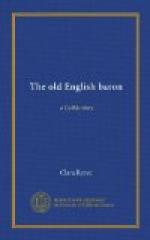The year following was born a second son, who was called Philip Harclay; upon him the noble knight of that name settled his estate in Yorkshire; and by the king’s permission, he took the name and arms of that family.
The third son was called William; he inherited the fortune of his uncle of that name, who adopted him, and he made the Castle of Lovel his residence, and died a bachelor.
The fourth son was called Edmund; the fifth Owen; and there was also a daughter, called Emma.
When time had worn out the prejudices of Sir Robert Fitz-Owen, the good old Baron of that name proposed a marriage between his eldest son and heir, and the daughter of Edmund Lord Lovel, which was happily concluded. The nuptials were honoured with the presence of both families; and the old Baron was so elevated with this happy union of his descendants, that he cried out, “Now I am ready to die—I have lived long enough—this is the band of love that unites all my children to me, and to each other!” He did not long survive this happy event; he died full of years and honours, and his name was never mentioned but with the deepest marks of gratitude, love and veneration. Sweet is the remembrance of the virtuous, and happy are the descendants of such a father! they will think on him and emulate his virtues—they will remember him, and be ashamed to degenerate from their ancestor.
Many years after Sir Philip Harclay settled at the Castle, he received tidings from his friend Zadisky, by one of the two servants who attended him to the Holy Land. From him he learned that his friend had discovered, by private advices, that he had a son living in Palestine, which was the chief motive of his leaving England; that he had met with various adventures in pursuit of him; that at length he found him, converted him to the Christian religion, and then persuaded him to retire from the world into a monastery by the side of Mount Libanus, where he intended to end his days.
That Walter, commonly called Lord Lovel, had entered into the service of the Greek emperor, John Paleologus, not bearing to undergo a life of solitude and retirement; that he made up a story of his being compelled to leave his native country by his relations, for having accidentally killed one of them, and that he was treated with great cruelty and injustice; that he had accepted a post in the emperor’s army, and was soon after married to the daughter of one of the chief officers of it.
Zadisky foresaw, and lamented the downfall of that Empire, and withdrew from the storm he saw approaching. Finally, he bade the messenger tell Sir Philip Harclay and his adopted son, that he should not cease to pray for them, and desired their prayers in return.
Sir Philip desired Lord Lovel to entertain this messenger in his service. That good knight lived to extreme old age in honour and happiness, and died in the arms of his beloved Edmund, who also performed the last duties to his faithful Joseph.




